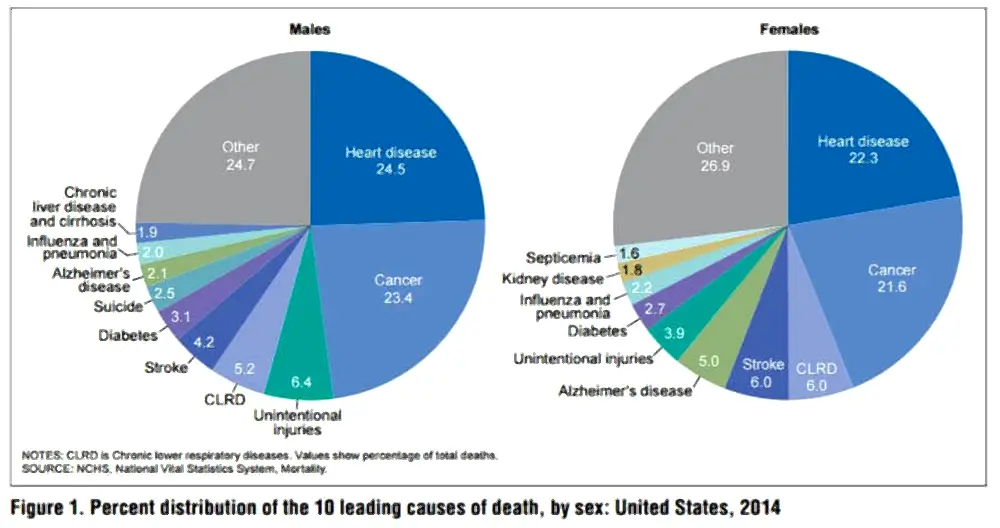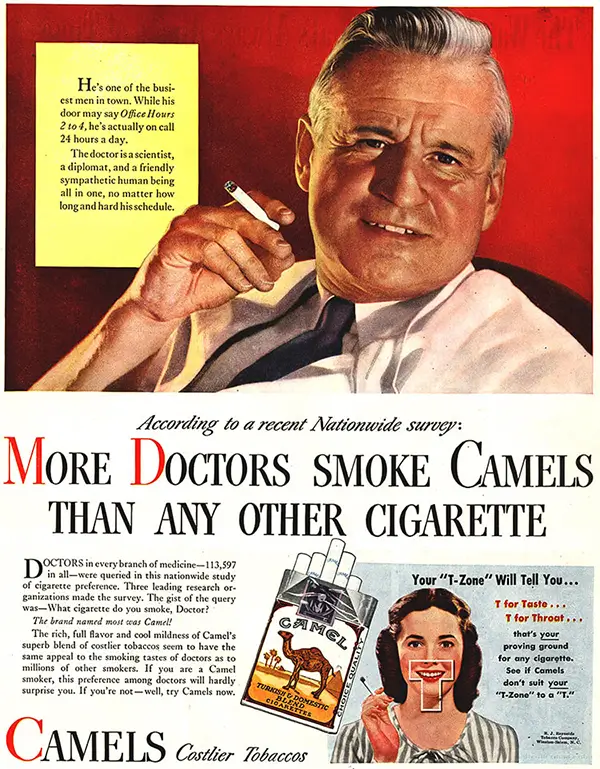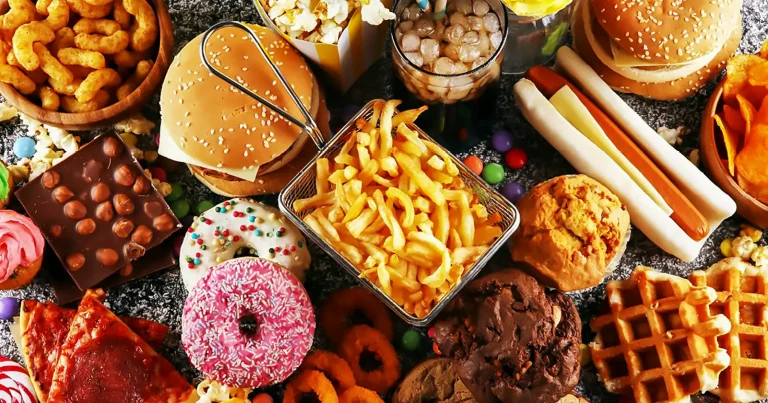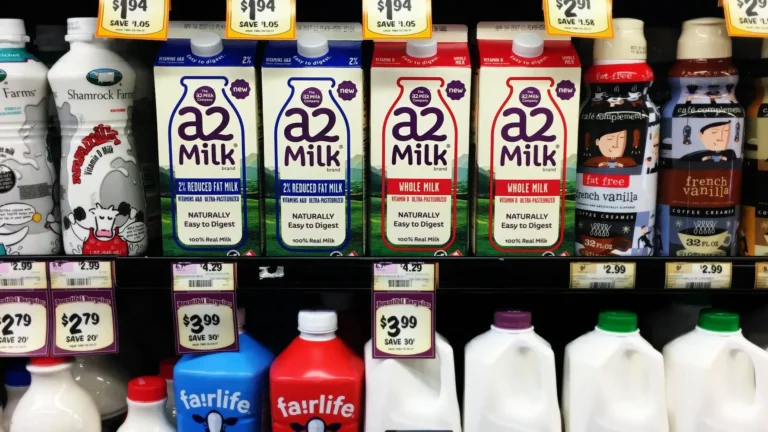Chronic diseases and mortality- The real numbers
In the top 10 leading causes of death, this includes chronic diseases, most are caused by a non-evolutionary congruent diet (high amounts of animal products).
Milos Pokimica
Written By: Milos Pokimica
Medically Reviewed by: Dr. Xiùying Wáng, M.D.
Updated June 9, 2023Most of our chronic diseases are caused by diet and lifestyle. People have a hard time believing how many serious health problems are caused by a non-evolutionary congruent diet. Every year Center for Disease Control and Prevention updates the list of leading causes of death in the United States and for all other developed countries statistics are very similar. When you are developed as a nation, then you have more money to spend on processed food and meat. Of the 10 top leading causes of death, most are caused by life choices. The data is alarming. It is beyond that.
I will try to translate data from the chart to be more clearly understood. When data shows that 24 percent of people are going to die from heart disease what that means is that for example if you have a family of four, one of them will probably die from heart disease and one from cancer. Two left. Then after that, go and take your pick, you have diabetes, stroke, different neurological conditions, or liver cirrhosis, crld is 5% (tobacco smoking is by far the most critical risk factor for chronic bronchitis and emphysema, accounting for about 80% of all cases). All of these diseases are chronic diseases. They didn’t exist in the past in such large numbers. When someone says chronic diseases what they actually mean is lifestyle diseases.
The other side of the coin is that normal painless death by natural aging, just forget about it. Doesn’t exist anymore. The problem is not just about the way we are going to die, it is more about when because life expectancy is dramatically shortened and our quality of life is destroyed. We are not going to just drop dead from cancer. There is going to be a lot of chemotherapy and depression and again cancer goes away then reappears again after a couple of years. When you have a stroke and still manage to survive, you can lose a big chunk of your brain, and before you die from a heart attack, there are going to be a lot of treatments.
What treatments include are all the lifestyle changes to correct the bad habits that have led to the creation of chronic diseases in the first place that we do not like, plus drugs and surgery. Quitting smoking, physical activity, maintaining a healthy weight, and managing stress (getting upset or angry can trigger a heart attack). No salting of food and of course cholesterol-lowering drugs. Statins are the standard line, and almost all patients will be prescribed one of them but what they do not like to tell is that statistically when we look at real numbers, they are only useful in the early stages of treating heart disease. They are effective also in those patients that are at elevated risk but still without cardiovascular disease as some sort of prevention. Statins also, and that is rarely mentioned, have side effects that are no joke. They include muscle pain, the risk of diabetes mellitus, and abnormalities in liver enzyme tests.
Who wants to be in constant pain? What they in reality do is block something known as s HMG-CoA. They inhibit the enzyme HMG-CoA which has a crucial role in producing cholesterol. However, again if you go and eat it blocks enzymes in your own liver and your own production has no point.
That means no meat, no eggs, no dairy. If we look at what these diseases do, it is a life of despair.
It is not just:” Well ok I will live the way I like then if I die in 60 instead of 65 who cares, a will die happy.” If you think that, you are in dangerous delusion. Today 5-year-old children already have signs of arteriosclerotic plaque with approximately 50% of children having it at 2-15 years of age to 85% at 21-39 years of age (Hong, 2010). This is not normal. Arteriosclerosis does not usually happen in aging like cholesterol confusions would like us to believe because of all of the stressful blood flow.
Arteriosclerosis is a disease, not the aging process.
Diseases start early and could last for decades before we finally go. The death rate of heart disease and stroke will probably be much higher, but some patients literally get scared to death. And they are right. They are about to die when they hear the news of cardiovascular disease, so some percentage of them do make lifestyle changes and manage to avoid a heart attack. However, again this is just a chart of diseases that will kill us.
The real, bigger, and more advanced chart is the one with the whole list of chronic diseases that would not necessarily kill us, although some can do that too, but will “just” keep our lives in misery. These are so-called chronic diseases like arthritis, asthma, allergies, back pain, Crohn’s, osteoporosis, autoimmune conditions like psoriasis, different forms of lupus, multiple sclerosis, a wide variety of mental diseases like add, depression, bipolar, epilepsy, addictions of different forms, or just “regular” conditions like anxiety, acne vulgaris, low level of energy and fatigue, sleep, memory, and mood issues.
All of this is well-accepted science and recognized as a scientific fact. These diseases didn’t exist in the past and in rural areas of the undeveloped world until recently. Thousands of studies on the topic have been done now. For example, over the past 40 years, two Adventist health studies have been conducted involving more than 50,000 Californian Adventists. The famous China study was maybe one of the best known among common people. There was also Harvard’s Meat & Mortality Studies (Pan et al., 2012). In Harvard studies, more than 100,000 people for two decades were followed. The biggest one so far followed half a million people for ten years.
It is not easy to follow a half million people for ten years. It was The National Institutes of Health study so far largest study of diet and health in history (Sinha et al., 2009).
There was actually no real need to do all of these studies. The diet wars of today are all artificial. The science was well aware of mortality risk even in the ’50s. Even before WW2, there was knowledge in the scientific community but it was mostly ignored.
All of the chronic diseases today are known as diseases of affluence. When the standard of living goes up so does meat consumption. Today there is only resistance in common people and industry and government that does not want to implement new dietary guidelines because of a variety of reasons.
Standard American animal product-dominated diet is extremely nutrient deficient. With all of the meat and eggs and dairy, more than 60% of people eating it are deficient in magnesium. More than 90% of people eating it are potassium deficient and more than 80% deficient in vitamin E. Animal products do not contain magnesium and vitamin E in adequate amounts. On top of that, there are other “non-essential” nutrients that are not present in animal products like non-essential minerals, antioxidants, phytochemicals, iodine, vitamin D, selenium, and so on. Minimal recommended values are in many cases deliberately low. An example would be an RDA for iodine.
This story is the story of the quality of life. Treatment is expensive.
It is the same story as once was with smoking. Until dietary guidelines are changed and they will be, it would be the responsibility of every individual for himself to learn about diet and nutrition.
This is hard to do with all of the conflicting information. Today people still smoke but at least they are consciously aware of the associated risks.
No one should force anyone into doing something. The risks should be acknowledged and it should be a conscious decision.
References:
- Hong Y. M. (2010). Atherosclerotic cardiovascular disease beginning in childhood. Korean circulation journal, 40(1), 1–9. https://doi.org/10.4070/kcj.2010.40.1.1
- Pan, A., Sun, Q., Bernstein, A. M., Schulze, M. B., Manson, J. E., Stampfer, M. J., Willett, W. C., & Hu, F. B. (2012). Red meat consumption and mortality: results from 2 prospective cohort studies. Archives of internal medicine, 172(7), 555–563. https://doi.org/10.1001/archinternmed.2011.2287
- Sinha, R., Cross, A. J., Graubard, B. I., Leitzmann, M. F., & Schatzkin, A. (2009). Meat intake and mortality: a prospective study of over half a million people. Archives of internal medicine, 169(6), 562–571. https://doi.org/10.1001/archinternmed.2009.6
Related Posts
Do you have any questions about nutrition and health?
I would love to hear from you and answer them in my next post. I appreciate your input and opinion and I look forward to hearing from you soon. I also invite you to follow us on Facebook, Instagram, and Pinterest for more diet, nutrition, and health content. You can leave a comment there and connect with other health enthusiasts, share your tips and experiences, and get support and encouragement from our team and community.
I hope that this post was informative and enjoyable for you and that you are prepared to apply the insights you learned. If you found this post helpful, please share it with your friends and family who might also benefit from it. You never know who might need some guidance and support on their health journey.
– You Might Also Like –

Learn About Nutrition
Milos Pokimica is a doctor of natural medicine, clinical nutritionist, medical health and nutrition writer, and nutritional science advisor. Author of the book series Go Vegan? Review of Science, he also operates the natural health website GoVeganWay.com
Medical Disclaimer
GoVeganWay.com brings you reviews of the latest nutrition and health-related research. The information provided represents the personal opinion of the author and is not intended nor implied to be a substitute for professional medical advice, diagnosis, or treatment. The information provided is for informational purposes only and is not intended to serve as a substitute for the consultation, diagnosis, and/or medical treatment of a qualified physician or healthcare provider.NEVER DISREGARD PROFESSIONAL MEDICAL ADVICE OR DELAY SEEKING MEDICAL TREATMENT BECAUSE OF SOMETHING YOU HAVE READ ON OR ACCESSED THROUGH GoVeganWay.com
NEVER APPLY ANY LIFESTYLE CHANGES OR ANY CHANGES AT ALL AS A CONSEQUENCE OF SOMETHING YOU HAVE READ IN GoVeganWay.com BEFORE CONSULTING LICENCED MEDICAL PRACTITIONER.
In the event of a medical emergency, call a doctor or 911 immediately. GoVeganWay.com does not recommend or endorse any specific groups, organizations, tests, physicians, products, procedures, opinions, or other information that may be mentioned inside.
Editor Picks –
Milos Pokimica is a doctor of natural medicine, clinical nutritionist, medical health and nutrition writer, and nutritional science advisor. Author of the book series Go Vegan? Review of Science, he also operates the natural health website GoVeganWay.com
Latest Articles –
Plant Based News
-
Vegan Mini Flank Galettes With Caramelized Onion & Pear
on November 25, 2025
-
Sprout Power: Boost Digestion, Protein, and Energy with Homemade Lentils
on November 25, 2025
-
Lidl Calls For Mandatory Plant-Based Targets To ‘Level The Playing Field’
on November 25, 2025
-
Vegetarian Society Reports ‘Significant Rise’ In Brands Adopting Plant-Based Certification
on November 24, 2025
-
10 High-Protein And Gluten-Free Vegan Recipes
on November 24, 2025
-
Gambian Stew With Easy Peanut Hummus (Domoda)
on November 23, 2025
-
National Diabetes Month: 65% Of Americans Open To Preventative Plant-Based Diets
on November 23, 2025
Top Health News — ScienceDaily
- The body trait that helps keep your brain youngon November 25, 2025
Scientists discovered that more muscle and less hidden abdominal fat are linked to a younger biological brain age. Deep visceral fat appeared to accelerate brain aging, while muscle mass offered a protective effect.
- How personalized algorithms trick your brain into wrong answerson November 25, 2025
Personalized algorithms may quietly sabotage how people learn, nudging them into narrow tunnels of information even when they start with zero prior knowledge. In the study, participants using algorithm-curated clues explored less, absorbed a distorted version of the truth, and became oddly confident in their wrong conclusions. The research suggests that this kind of digital steering doesn’t just shape opinions—it can reshape the very foundation of what someone believes they understand.
- Scientists reveal a hidden alarm system inside your cellson November 25, 2025
Ribosomes don’t just make proteins—they can sense when something’s wrong. When they collide, they send out stress signals that activate a molecule called ZAK. Researchers uncovered how ZAK recognizes these collisions and turns them into protective responses. The discovery shows how cells quickly spot trouble.
- Cocoa and tea may protect your heart from the hidden damage of sittingon November 25, 2025
Scientists found that high-flavanol foods can prevent the decline in blood vessel function that occurs after prolonged sitting. Even physically fit men weren’t protected unless they had consumed flavanols beforehand. A cocoa drink rich in these compounds kept arteries functioning normally. Everyday foods like berries, apples, tea, and certain cocoa products could offer a simple way to protect long-term vascular health.
- Vegan diet beats Mediterranean for weight loss even with potatoes and grainson November 24, 2025
Participants lost more weight on a low-fat vegan diet than on the Mediterranean diet, largely due to eliminating animal foods and reducing oils and nuts. Increased intake of plant foods, even “unhealthy” ones, was strongly associated with greater weight loss.
- Scientists find hidden switch that lets tumors shapeshift and evade treatmenton November 24, 2025
Scientists are uncovering what makes some carcinomas so resistant: their ability to change identity. Two new studies reveal crucial proteins and structures that could become targets for future therapies. These discoveries deepen understanding of how tumors reprogram themselves and point toward highly specific treatments. The work raises hopes for safer, more selective cancer drugs.
- Scientists find a hidden weak spot that may trigger Alzheimer’son November 24, 2025
Scientists have found that a mutation tied to Alzheimer’s disrupts the production and quality of exosomes—tiny cell-made communication packets. Cells with the defective SORLA protein generate fewer exosomes and ones far less able to support nearby brain cells. This weakness may be a key driver of Alzheimer’s development. The research points to new treatment strategies that enhance or restore exosome function.
PubMed, #vegan-diet –
- The German LAKE-score reliably predicts urinary and dietary potential renal acid load: a three-armed translational studyon November 25, 2025
CONCLUSION: The German version of the LAKE score is a rapid, inexpensive and feasible tool for an initial PRAL evaluation in a clinical context, characterized by a good validity and reliability. Results suggest that the German LAKE score could be suitable as an estimate for an individual’s PRAL, and could also guide clinicians to make dietary recommendations and monitor PRAL-relevant changes in individual patients.
- Biological versus Technical Reliability of Epigenetic Clocks and Implications for Disease Prognosis and Intervention Responseon November 24, 2025
DNA methylation-based aging biomarkers, or epigenetic clocks, are increasingly used to estimate biological age and predict health outcomes. Their translational utility, however, depends not only on predictive accuracy but also on reliability, the ability to provide consistent results across technical replicates and repeated biological measures. Here, we leveraged the TranslAGE platform to comprehensively evaluate the technical and biological reliability of 18 Epigenetic clocks, including…
- Learning molecular fingerprints of foods to decode dietary intakeon November 24, 2025
Assessing dietary intake from biological samples provides critical objective insights into nutrition and health. We present a reference-based strategy using untargeted metabolomics to estimate relative dietary composition. The approach learns food-specific molecular ion features first – both annotated and unannotated – via supervised classification and discriminant analysis. These features then guide extraction of corresponding MS1 intensities from unknown samples, enabling proportional,…
- Eating within planetary boundaries – a cross-country analysis of iodine provision from the EAT-Lancet dieton November 24, 2025
The EAT-Lancet Commission’s 2019 reference diet promotes health and environmental sustainability through predominantly plant-based foods, raising concerns about micronutrient adequacy, particularly iodine. This study evaluated the iodine content of the EAT-Lancet diet across sixteen countries using national food composition data. Iodine intake was modelled under three scenarios: (1) strict adherence to specified food items; (2) inclusion of a broader range of foods within each group; and (3) […]
- Vegetarian and Vegan Diets and the Risk of Hip Fracture in Adults: A Systematic Review and Meta-analysison November 23, 2025
CONCLUSION: These findings emphasize the importance of incorporating dietary patterns into strategies for promoting bone health, especially among individuals following plant-based diets. Healthcare providers should offer guidance to individuals adopting vegetarian or vegan diets to ensure adequate nutrient intake and support bone health.
Random Posts –
Featured Posts –

Latest from PubMed, #plant-based diet –
- Impact of Healthy Diet Shifts on Soil Greenhouse Gas Emissions Across Europeby Vasilis Michailidis on November 25, 2025
Shifting towards healthy, plant-based diets is widely recognized as a strategy to reduce greenhouse gas emissions (GHG) from food systems, primarily through reduced methane emissions from livestock. However, the implications of this transition for soil-based GHG emissions, a major contributor to climate change, remain uncertain. We used the MAGNET economic model and the DayCent biogeochemical model to assess the impacts of dietary shifts aligned with the EAT-Lancet guidelines on soil organic…
- Plant-based diets especially healthy ones are negatively associated with depression: a cross-sectional studyby Bao Zhang on November 25, 2025
CONCLUSIONS: Plant-based diets, especially when they are enriched with healthier plant foods, may be beneficial for primary prevention of depression. However, plant-based diets that emphasize less healthy plant foods are associated with higher depression levels among US adults.
- The German LAKE-score reliably predicts urinary and dietary potential renal acid load: a three-armed translational studyby Maximilian Andreas Storz on November 25, 2025
CONCLUSION: The German version of the LAKE score is a rapid, inexpensive and feasible tool for an initial PRAL evaluation in a clinical context, characterized by a good validity and reliability. Results suggest that the German LAKE score could be suitable as an estimate for an individual’s PRAL, and could also guide clinicians to make dietary recommendations and monitor PRAL-relevant changes in individual patients.
- Taxonomic and functional shifts in the rumen microbiome of buffalo calves under long-term strategic supplementation of phyto-feed additivesby Pramod Kumar Soni on November 24, 2025
INTRODUCTION: The present study aimed to understand the shift in the rumen microbiome of buffaloes fed diets with and without phyto-additives. The rationale was based on the hypothesis that plant-based additives can modulate the microbial population in the rumen, potentially reducing methane production and enhancing fiber degradation. Given the possibility that prolonged use of the same additives may lead to microbial adaptation and diminished efficacy, the study also investigated the effects […]
- Anti-Cancer, Anti-Inflammatory, and Analgesic Effects of Taxus wallichaina Extracts and Its Biosynthesized Silver Nanoparticlesby Fazli Hadi on November 24, 2025
This study investigates the green synthesis of silver nanoparticles (AgNPs) using Taxus wallichiana Zucc. and evaluates their pharmacological potential. Taxus wallichiana, a medicinal plant rich in bioactive compounds, was utilized to synthesize AgNPs in an eco-friendly manner, leveraging phytochemicals as reducing and stabilizing agents. Characterization techniques, including UV-Vis spectroscopy confirmed the peak at approximately 430 nm, reaching its maximum at 0.72 with significant surface…
- Associations of Sociodemographic Factors, Lifestyle Habits, and Insomnia Severity with Obesity Indices in Spanish Workers: Sex-Specific Differencesby José Luis Ribes Valles on November 24, 2025
Background: Obesity and insomnia are prevalent public health issues with shared behavioral and physiological pathways. However, their interplay remains understudied in occupational cohorts. Obesity and insomnia are prevalent public health issues with shared behavioral and physiological pathways. However, their interplay remains understudied in occupational cohorts. This study aimed to evaluate the associations of sociodemographic factors, lifestyle habits, and insomnia severity with multiple…




























